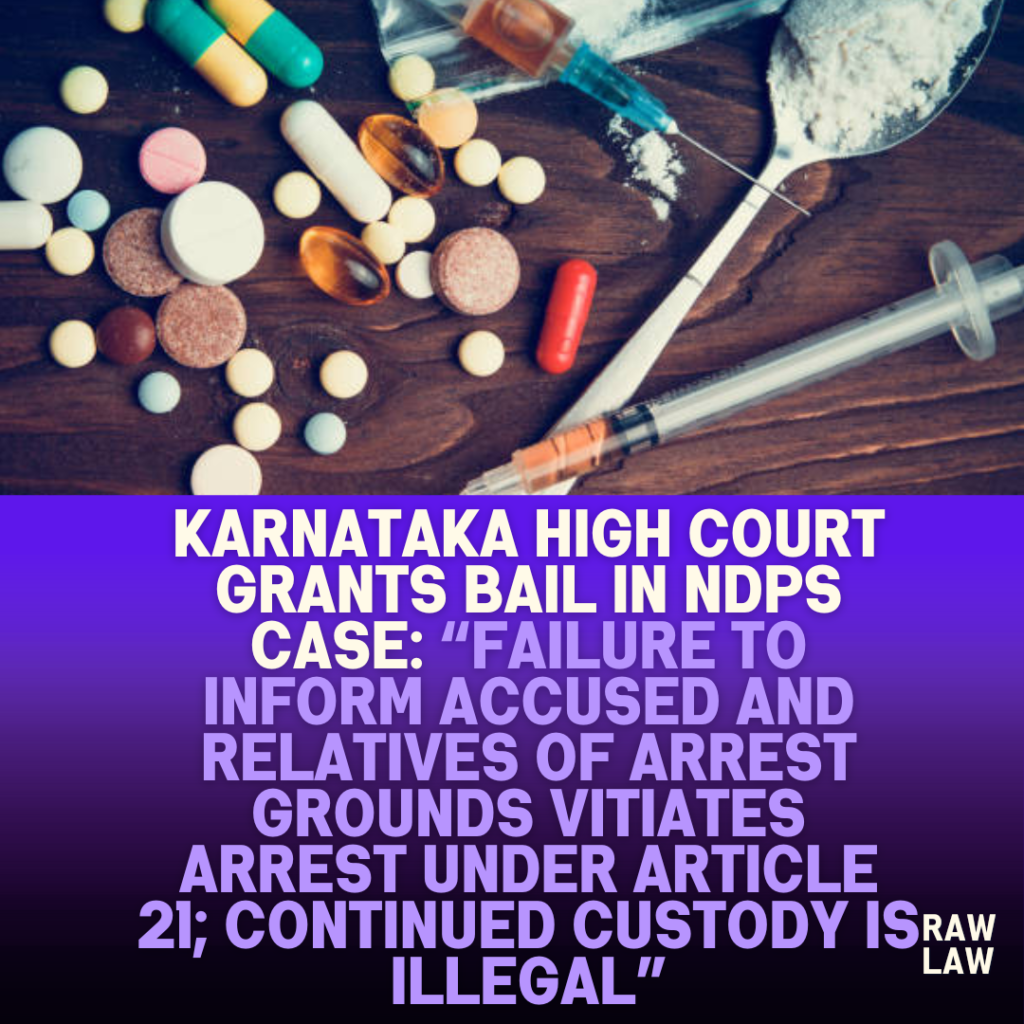Court’s Decision
The Karnataka High Court, allowed a criminal petition filed under Section 439 of the CrPC (now Section 483 of the BNSS) seeking regular bail in a case under Section 20(b)(ii)(c) of the NDPS Act and Section 192(1) of the Motor Vehicles Act. Justice S. Vishwajith Shetty held that the failure of the authorities to serve the grounds of arrest to the accused and communicate the same to his relatives constituted a violation of Articles 21 and 22(1) of the Constitution. Citing authoritative Supreme Court rulings, the Court declared that such failure renders the arrest illegal and granted bail, notwithstanding the embargo under Section 37 of the NDPS Act.
Facts
The petitioner, arraigned as Accused No. 1, was arrested on 09.03.2024, registered by Gonibeedu Police Station, Chikkamagaluru District. The case pertained to an alleged seizure of 51.2 kilograms of ganja from a Maruti Omni vehicle. The petitioner was apprehended on the basis of a tip-off and has been in judicial custody since. A charge sheet was filed against him and another co-accused. His bail application before the trial court was rejected on 13.11.2024, prompting the present petition.
Issues
- Whether the accused is entitled to bail despite the rigor of Section 37(1)(b) of the NDPS Act.
- Whether the non-service of the grounds of arrest and failure to communicate them to relatives violates constitutional safeguards under Articles 21 and 22(1) of the Constitution of India.
Petitioner’s Arguments
Counsel for the petitioner contended that:
- The grounds of arrest were not served on the petitioner at the time of arrest.
- The petitioner’s friends and relatives were not informed about the arrest and its grounds.
- The petitioner has no prior criminal antecedents and has been in custody for over a year.
Respondent’s Arguments
The High Court Government Pleader, on instructions, did not dispute the claim that the grounds of arrest were not served on the petitioner and were not communicated to his relatives or friends.
Analysis of the Law
The Court analysed the legal implications of the alleged violation of Article 22(1), which mandates that a person arrested must be informed of the grounds of arrest “as soon as may be.” It was observed that non-compliance with this requirement vitiates the arrest and detainment, rendering continued custody illegal. The Court noted that Article 21 also incorporates due process of law, and any arrest not compliant with Article 22 also amounts to violation of Article 21.
Precedent Analysis
The Court relied on three landmark decisions:
- Pankaj Bansal v. Union of India, (2024) 7 SCC 576
- Held that serving the grounds of arrest on the accused is mandatory.
- Prabir Purkayastha v. State (NCT of Delhi), (2024) 8 SCC 254
- Reiterated the need to inform the arrestee and their associates about the arrest and its grounds.
- Vihaan Kumar v. State of Haryana, 2025 SCC OnLine SC 269
- The Court quoted Paragraph 14 from this judgment, stating that non-compliance with Article 22(1) violates Article 21 and renders the arrest illegal.
- “If the grounds of arrest are not informed… it would amount to a violation of the fundamental right of the arrestee… The arrest is vitiated… the person arrested cannot remain in custody even for a second.”
Court’s Reasoning
Taking note of the Supreme Court precedents, the Court held that the petitioner’s arrest was rendered illegal due to non-service of the grounds of arrest and non-communication to his relatives. This violation, even in the context of stringent NDPS provisions, justified grant of bail under constitutional principles. The Court found the petitioner’s continued custody, under such circumstances, to be unsustainable.
Conclusion
The petition was allowed, and the petitioner was granted bail in subject to this conditions:
- Execution of a personal bond of ₹1,00,000/- with two sureties (one local).
- Regular appearance before the trial court.
- No tampering with witnesses or commission of similar offences.
- No departure from trial court jurisdiction without permission.
Implications
This order underscores the growing judicial emphasis on safeguarding constitutional rights during arrests, even in cases involving serious offences like those under the NDPS Act. It affirms that procedural violations, particularly concerning Article 22, will render arrests illegal, and bail will be granted irrespective of statutory bars under special legislations.
Also Read: Madhya Pradesh High Court Sets Aside Conviction in Alleged Murder of Wife



